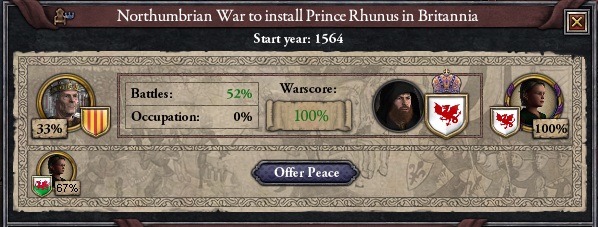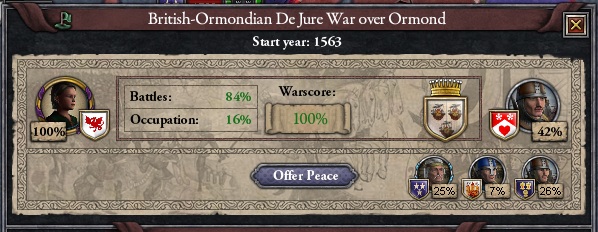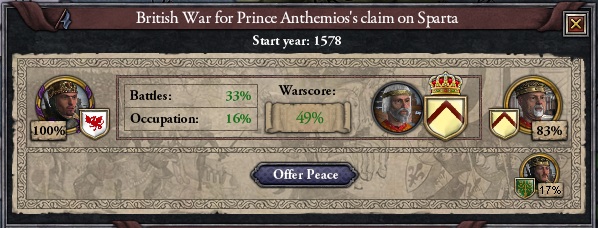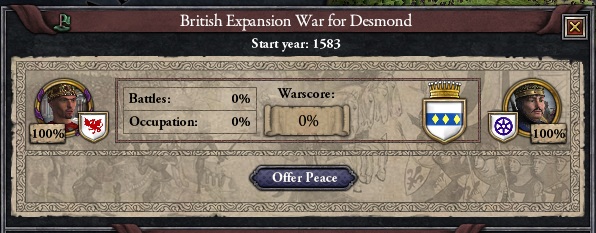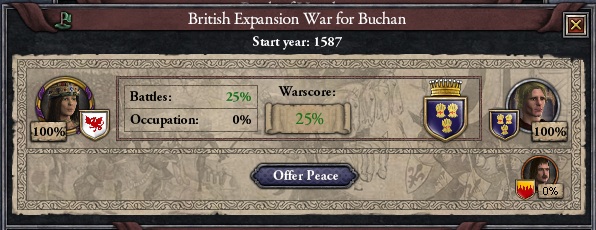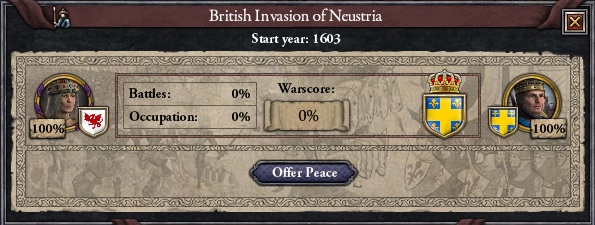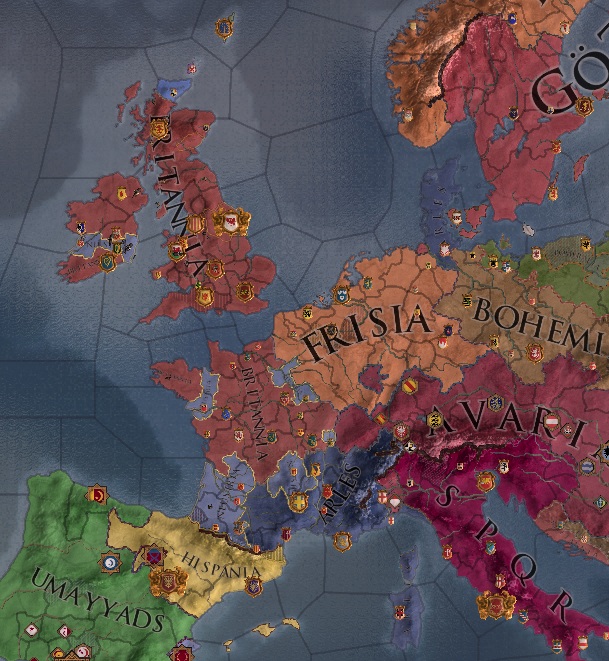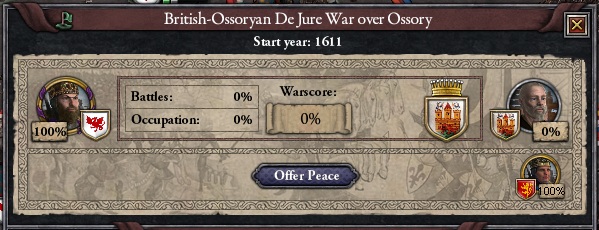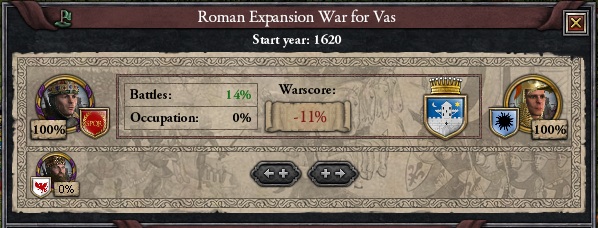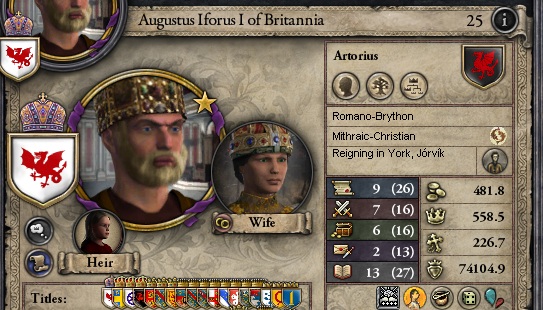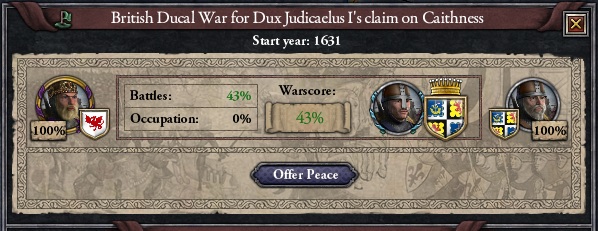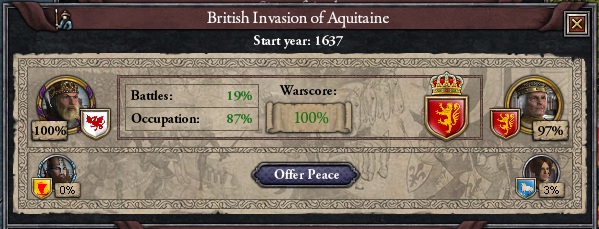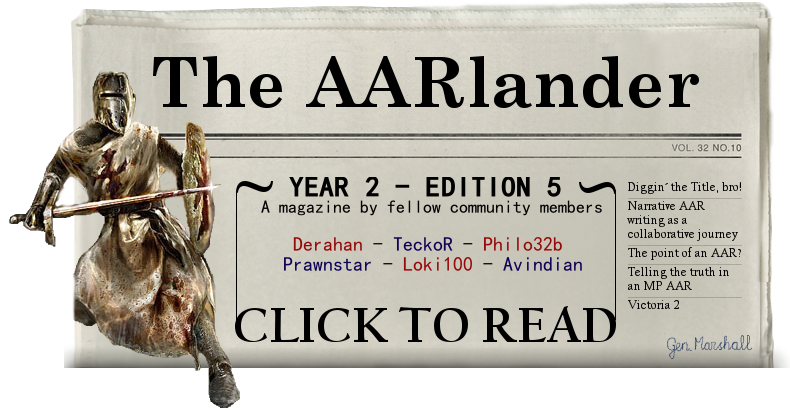Annales Gentis Artorii
Being the Chronicle of those Kings and Emperors reigning
between the years 1066 and 1555 who claimed
descent from Lucius Artorius Castus,
appointed Supreme Military Commander
of Britannia by Roman Emperor Alexandros III
House Pendragon
Kings of Brythonia
Arturus I 'the Scarred', 1049-1112, king 1060-1112
Kozyron I 'the Fat', 1079-1141, king 1112-1124 (Arturus I)
Arturus II 'the Bold', 1095-1152, king 1124-1144 (Urianos, Arturus I)
House Artorius, Welsh branch
Kings of Cymru
Maximus I 'the Cruel', 1046-1132, Duke of Deheubarth 1060-1132, King of Cymru 1111-1132
Iorwerth I, 1088-1141, king 1132-1141 (Dafydd, Maximus I)
Dafydd I 'the Blind', 1135-1187, king 1141-1187 (Iorwerth I, Dafydd, Maximus I)
Drystan I 'the Confessor', 1167-1232, king 1187-1232 (Dafydd I, Iorwerth I, Dafydd, Maximus I)
Dafydd II 'the Hunter', 1189-1260, king 1232-1240 (Drystan I, Dafydd I, Iorwerth I, Dafydd, Maximus I)
see also: Kings of Neustria
Kings of Alba
Custennin I 'the Proud', 1219-1285, king 1226-1285 (Asa, Drystan, Dafydd, Iorwerth, Dafydd, Maximus)
Ferchar II 'the Bold', 1275-1328, king 1285-1328 (Custennin, Custennin I, Asa, Drystan, Dafydd, Iorwerth, Dafydd, Maximus)
Fergus I 'Ironside', 1297-1369, king 1328-1369 (Ferchar II, Custennin, Custennin I, Asa, Drystan, Dafydd, Iorwerth, Dafydd, Maximus)
Fergus II 'the Scarred', 1345-1389, king 1369-1389 (Hugh, Fergus I, Ferchar II, Custennin, Custennin I, Asa, Drystan, Dafydd, Iorwerth, Dafydd, Maximus)
Hugh I "the Wise', 1369-1394, king 1389-1394 (Fergus II, Hugh, Fergus I, Ferchar II, Custennin, Custennin I, Asa, Drystan, Dafydd, Iorwerth, Dafydd, Maximus)
Gilbert I, 1387-1403, king 1394-1403 (Hugh I, Fergus II, Hugh, Fergus I, Ferchar II, Custennin, Custennin I, Asa, Drystan, Dafydd, Iorwerth, Dafydd, Maximus)
Fergus III, 1391-1468, king 1403-1407 (Hugh I, Fergus II, Hugh, Fergus I, Ferchar II, Custennin, Custennin I, Asa, Drystan, Dafydd, Iorwerth, Dafydd, Maximus)
Duncan I, 1391-1422, king 1407-1422 (Adam, Fergus II, Hugh, Fergus I, Ferchar II, Custennin, Custennin I, Asa, Drystan, Dafydd, Iorwerth, Dafydd, Maximus)
Alexander I 'the Dragon', 1415-1482, king 1422-1482(Duncan I, Adam, Fergus II, Hugh, Fergus I, Ferchar II, Custennin, Custennin I, Asa, Drystan, Dafydd, Iorwerth, Dafydd, Maximus)
Evrard I 'the Stammerer', 1440-1502, king 1482-1502 (Alexander I, Duncan I, Adam, Fergus II, Hugh, Fergus I, Ferchar II, Custennin, Custennin I, Asa, Drystan, Dafydd, Iorwerth, Dafydd, Maximus)
Alexander II 'the Able', 1488-1514, king 1502-1514 (Evrard I, Alexander I, Duncan I, Adam, Fergus II, Hugh, Fergus I, Ferchar II, Custennin, Custennin I, Asa, Drystan, Dafydd, Iorwerth, Dafydd, Maximus)
Alan I, 1510-1520, king 1514-1520 (Alexander II, Evrard I, Alexander I, Duncan I, Adam, Fergus II, Hugh, Fergus I, Ferchar II, Custennin, Custennin I, Asa, Drystan, Dafydd, Iorwerth, Dafydd, Maximus)
Catriona I, 1507-1524, queen 1520-1524 (Alexander II, Evrard I, Alexander I, Duncan I, Adam, Fergus II, Hugh, Fergus I, Ferchar II, Custennin, Custennin I, Asa, Drystan, Dafydd, Iorwerth, Dafydd, Maximus)
Aufrica I, 1464-1536, queen 1524-1536 (Evrard I, Alexander I, Duncan I, Adam, Fergus II, Hugh, Fergus I, Ferchar II, Custennin, Custennin I, Asa, Drystan, Dafydd, Iorwerth, Dafydd, Maximus)
Kings of Neustria
Dafydd I 'the Hunter', 1189-1260, king 1241-1260 (Drystan, Dafydd, Iorwerth, Dafydd, Maximus)
Cadell I 'the Great', 1231-1288, king 1260-1288 (Gronw, Drystan, Dafydd, Iorwerth, Dafydd, Maximus)
Gruffydd I, 1248-1293, king 1288-1293 (Cadell I, Gronw, Drystan, Dafydd, Iorwerth, Dafydd, Maximus)
Cadell II 'Half-Hand', 1276-1325, king 1293-1325 (Grufydd I, Cadell I, Gronw, Drystan, Dafydd, Iorwerth, Dafydd, Maximus)
Grufydd II 'the Just', 1294-1361, king 1325-1361 (Cadell II, Grufydd I, Cadell I, Gronw, Drystan, Dafydd, Iorwerth, Dafydd, Maximus)
Gruffydd III 'the Theologian', 1337-1412, king 1361-1412 (Caradog, Gruffydd II, Cadell II, Grufydd I, Cadell I, Gronw, Drystan, Dafydd, Iorwerth, Dafydd, Maximus)
Othon I 'the Hammer', 1389-1430, king 1412-1430 (Brochfael, Gruffydd III, Caradog, Gruffydd II, Cadell II, Grufydd I, Cadell I, Gronw, Drystan, Dafydd, Iorwerth, Dafydd, Maximus)
Brochfael I 'the Rich', 1421-1476, king 1430-1476 (Othon I, Brochfael, Gruffydd III, Caradog, Gruffydd II, Cadell II, Grufydd I, Cadell I, Gronw, Drystan, Dafydd, Iorwerth, Dafydd, Maximus)
Othon II 'the Bold', 1470-1555, king 1470-1555 (
Alienor, Brochfael I, Othon I, Brochfael, Gruffydd III, Caradog, Gruffydd II, Cadell II, Grufydd I, Cadell I, Gronw, Drystan, Dafydd, Iorwerth, Dafydd, Maximus)
Adrien I 'the Great', 1519-, king 1555- (Othon II, (Alienor, Brochfael I, Othon I, Brochfael, Gruffydd III, Caradog, Gruffydd II, Cadell II, Grufydd I, Cadell I, Gronw, Drystan, Dafydd, Iorwerth, Dafydd, Maximus)
House Artorius, Cornish branch
Kings of Cornovia
Magnus I 'the Fanged', 1048-1110, king 1060-1110
Eludus I, 1085-1130, king 1110-1130 (Aeronwyn, Magnus I)
Magnus II, 1090-1138, king 1130-1138 (Justin, Magnus I)
Morganus I, 1113-1139, king 1138-1139 (Eludus I, Aeronwyn, Magnus I)
Ieuanus I 'the Great', 1114-1171, king of Cornovia 1139-1171, king of Brythonia 1146-1171 (Magnus II, Justin, Magnus I)
Kings of Brythonia and Cornovia
Justin I 'the Bold', 1116-1172, king 1171-1172 (Magnus II, Justin, Magnus I)
Tegonius I 'the Great', 1134-1206, king 1201-1206 (Magnus II, Justin, Magnus I)
Ysfaelos I, 1134-1206, king 1201-1206 (Magnus II, Justin, Magnus I)
Uther I, 1150-1208, king 1206-1208 (Justin I, Magnus II, Justin, Magnus I)
Thomos I 'the Monk', 1185-1235, king 1208-1235 (Uther I, Justin I, Magnus II, Justin, Magnus I)
Uther II, 1202-1250, king of Brythonia and Cornovia 1235-1250, king of Cambria 1240-1250 (Thomos I, Uther I, Justin I, Magnus II, Justin, Magnus I)
Kings of Brythonia, Cambria and Cornovia
Cadwalus I, 1212-1268, king 1250-1268 (Thomos I, Uther I, Justin I, Magnus II, Justin, Magnus I)
Idwalus I 'Ironside', 1198-1269, king 1268-1269 (Idwalus, Einion, Iago, Ceredigus, Ynyrus, Magnus I)
Cynwallus I 'the Pious', 1233-1298, king 1269-1298 (Idwalus I, Idwalus, Einion, Iago, Ceredigus, Ynyrus, Magnus I)
Iforus I, 1270-1304, king 1298-1304 (Cynwallus I, Idwalus I, Idwalus, Einion, Iago, Ceredigus, Ynyrus, Magnus I)
Cynfarus I, 1282-1312, king 1304-1312 (Cynwallus I, Idwalus I, Idwalus, Einion, Iago, Ceredigus, Ynyrus, Magnus I)
Ithelus I, 1303-1321, king 1312-1321 (Cynfarus I, Cynwallus I, Idwalus I, Idwalus, Einion, Iago, Ceredigus, Ynyrus, Magnus I)
Dafydd I, 1304-1322, king 1321-1322 (Cynwallus I, Idwalus I, Idwalus, Einion, Iago, Ceredigus, Ynyrus, Magnus I)
Arthfaelus I, 1259-1323, king 1322-1323 (Eudocia, Maelrys, Maelrys, Tegonius I, Magnus II, Justin, Magnus I)
Paulus I 'the Monk', 1284-1350, king of Brythonia, Cambria and Cornovia 1323-1350, king of Anglia 1337-1350, king of Northanhymbra 1349-1350 (Arthfaelus I, Eudocia, Maelrys, Maelrys, Tegonius I, Magnus II, Justin, Magnus I)
Kings of Brythonia, Cambria, Anglia, Northanhymbra and Cornovia
Arthfaelus II, 1306-1351, king 1350-1351 (Paulus I,Arthfaelus I, Eudocia, Maelrys, Maelrys, Tegonius I, Magnus II, Justin, Magnus I)
Kings of Brythonia, Northanhymbra and Cornovia
Cadwgan I 'the Pious', 1339-1381, king of Brythonia, Northanhymbra and Cornovia 1351-1381, king of Cantia 1368-1381 (Petronius, Cadwgan, Arthfaelus I, Eudocia, Maelrys, Maelrys, Tegonius I, Magnus II, Justin, Magnus I)
Kings of Cambria and Anglia
Essyllt I 'the Pious', 1327-1369, queen 1351-1369 (Arthfaelos II, Paulus I,Arthfaelus I, Eudocia, Maelrys, Maelrys, Tegonius I, Magnus II, Justin, Magnus I)
Ithelus II 'the Brilliant', 1359-1390, king of Cambria and Anglia 1369-1390, king of Brythonia, Northanhymbra, Cantia and Cornovia 1381-1390 (Essyllt I, Arthfaelos II, Paulus I,Arthfaelus I, Eudocia, Maelrys, Maelrys, Tegonius I, Magnus II, Justin, Magnus I)
Kings of Brythonia, Cambria, Anglia, Northanhymbra and Cornovia
Tegius I, 1384-1410, king 1390-1410 (Ithelus II, Essyllt I, Arthfaelos II, Paulus I,Arthfaelus I, Eudocia, Maelrys, Maelrys, Tegonius I, Magnus II, Justin, Magnus I)
Ithelus II, 1402-1423, king 1410-1423 (Tegius I, Ithelus II, Essyllt I, Arthfaelos II, Paulus I,Arthfaelus I, Eudocia, Maelrys, Maelrys, Tegonius I, Magnus II, Justin, Magnus I)
Thomos I, 1404-1424, king 1423-1424 (Tegius I, Ithelus II, Essyllt I, Arthfaelos II, Paulus I,Arthfaelus I, Eudocia, Maelrys, Maelrys, Tegonius I, Magnus II, Justin, Magnus I)
Pyrus I 'the Confessor', 1423-1470, king 1424-1470, king of Diocleia 1456-1470, king of Armoria 1465-1470 (Thomos I, Tegius I, Ithelus II, Essyllt I, Arthfaelos II, Paulus I,Arthfaelus I, Eudocia, Maelrys, Maelrys, Tegonius I, Magnus II, Justin, Magnus I)
Kings of Brythonia, Cambria, Anglia, Northanhymbra, Cantia, Dioceleia, Armorica and Cornovia
Gamonus I 'the Able', 1447-1473, king 1470-1473 (Pyrus I, Thomos I, Tegius I, Ithelus II, Essyllt I, Arthfaelos II, Paulus I,Arthfaelus I, Eudocia, Maelrys, Maelrys, Tegonius I, Magnus II, Justin, Magnus I)
Gamonus II 'the Rich', 1469-1498, king 1473-1488 (Gamonus I, Pyrus I, Thomos I, Tegius I, Ithelus II, Essyllt I, Arthfaelos II, Paulus I,Arthfaelus I, Eudocia, Maelrys, Maelrys, Tegonius I, Magnus II, Justin, Magnus I)
Mallt I 'the Illustrious', 1468-1516, queen 1488-1516, queen of Northanhymbra 1488-1505, 1509-1516 (Gamonus I, Pyrus I, Thomos I, Tegius I, Ithelus II, Essyllt I, Arthfaelos II, Paulus I,Arthfaelus I, Eudocia, Maelrys, Maelrys, Tegonius I, Magnus II, Justin, Magnus I)
Gamonus III 'the Illustrious', 1510-1535, king 1516-1535, king of Diocleia 1516-1520 (Gamonus, Mallt I, Gamonus I, Pyrus I, Thomos I, Tegius I, Ithelus II, Essyllt I, Arthfaelos II, Paulus I,Arthfaelus I, Eudocia, Maelrys, Maelrys, Tegonius I, Magnus II, Justin, Magnus I)
Kings of Brythonia, Cambria, Anglia, Northanhymbra, Cantia, Armorica and Cornovia
Seisyllus I 'the Pious', 1527-, king of Cornovia 1535-, king of Brythonia, Cambria, Anglia, Northanhymbra, Cantia and Armorica 1535-1541, king of Alba 1541, emperor of Britannia 1541- (Gamonus III, Gamonus, Mallt I, Gamonus I, Pyrus I, Thomos I, Tegius I, Ithelus II, Essyllt I, Arthfaelos II, Paulus I,Arthfaelus I, Eudocia, Maelrys, Maelrys, Tegonius I, Magnus II, Justin, Magnus I)
Kings of Cantia
Cadogus I 'the Young', 1350-1418, king 1390-1418 (Kallinikos, Cadogus, Iolos, Cerie, Iorwerthus, Cadwalus I, Thomos I, Uther I, Justin I, Magnus II, Justin, Magnus I)
Bryanus I 'the Hunter', 1371-1426, king 1418-1426, (Cadogus I, Cadogus, Iolos, Cerie, Iorwerthus, Cadwalus I, Thomos I, Uther I, Justin I, Magnus II, Justin, Magnus I)
Cicely I 'the Terrible', 1407-1471, queen 1426-1438 (Uther, Cadogus I, Cadogus, Iolos, Cerie, Iorwerthus, Cadwalus I, Thomos I, Uther I, Justin I, Magnus II, Justin, Magnus I)
Morien I, 1480-1542, queen 1541-1542 (Cadwallus, Gestus, Stephanus, Gestus, Stephanus, Meirion, Iorwerthus, Einion, Iorwerthus, Urbonas, Cadwalus, Magnus II, Justin, Magnus I)
Judicaelus I 'the Silent', 1512-, king 1542- (Morien I, Cadwallus, Gestus, Stephanus, Gestus, Stephanus, Meirion, Iorwerthus, Einion, Iorwerthus, Urbonas, Cadwalus, Magnus II, Justin, Magnus I)
Kings of Cambria
Marchell I 'the Dragon', 1501-, queen 1541- (Aedanus, Padrigus, Seisyllus, Seisyllus, Tegius, Iestynus, Tysilion, Sulienus, Tysilion, Tysilion, Iolos, Maredudd, Iago, Justin, Iago, Einion, Iago, Ceredigus, Ynyrus, Magnus I)
Kings of Anglia
Stephanus I, 1509-1543, king 1541-1543 (Meurigus, Idwalus, Meurigus, Gamonus, Ynyrus, Paulus, Sulienus, Publigus, Justin, Thomos, Eudocia, Maelrys, Maelrys, Tegonius I, Magnus II, Justin, Magnus I)
Meurigus I, 1535-, king 1543- (Stephanus I, Meurigus, Idwalus, Meurigus, Gamonus, Ynyrus, Paulus, Sulienus, Publigus, Justin, Thomos, Eudocia, Maelrys, Maelrys, Tegonius I, Magnus II, Justin, Magnus I)
Kings of Northanhymbra
Sulienus I 'the Illustrious', 1495-1517, king 1505-1509 (Gamonus, Iorwerthus, Riothamus, Iago, Stephanus, Morganus, Lleigy, Uther, Uther, Arthois, Sulienus, Einion, Iago, Ceredigus, Ynyrus, Magnus I)
Rioualus I 'the Fowler', 1514-, king 1541- (Sulienus, Gamonus, Iorwerthus, Riothamus, Iago, Stephanus, Morganus, Lleigy, Uther, Uther, Arthois, Sulienus, Einion, Iago, Ceredigus, Ynyrus, Magnus I)
Kings of Armorica
Stephanus I 'the Brave', 1495-, king 1541- (Gamonus II, Gamonus I, Pyrus I, Thomos I, Tegius I, Ithelus II, Essyllt I, Arthfaelos II, Paulus I,Arthfaelus I, Eudocia, Maelrys, Maelrys, Tegonius I, Magnus II, Justin, Magnus I)
Kings of Alba
Cain I 'the Cruel', 1530-, king 1541- (Cedwyn, Nikodemos, Evangelos, Nikephoros, Loukas, Nikephoros, Eusebios, Gregoras, Megistos, Hippostratos, Sion, Julianus, Ffelis, Magnus II, Justin, Magnus I)
Kings of Sparta
Julianus I, 1158-1195, king 1181-1195 (Ffelis, Magnus, Justin, Magnus)
Sion I, 1189-1230, king 1195-1230 (Julianus I, Ffelis, Magnus, Justin, Magnus)
Hippostratos I, 1213-1266, king 1230-1266 (Sion I, Ffelis, Magnus, Justin, Magnus)
Megistos I 'the Fat', 1238-1300, king 1266-1300 (Hippostratos I, Sion I, Ffelis, Magnus, Justin, Magnus)
Hippostratos II, 1264-1302, king 1300-1302 (Megistos I, Hippostratos I, Sion I, Ffelis, Magnus, Justin, Magnus)
Gregoras I 'the Theologian', 1281-1315, king 1302-1315 (Antialcidas, Niketas, Sion I, Ffelis, Magnus, Justin, Magnus)
Eusebios I 'the Just', 1310-1348, king 1315-1348 (Gregoras I, Antialcidas, Niketas, Sion I, Ffelis, Magnus, Justin, Magnus)
Iakobos I, 1331-1350, king 1348-1350 (Eusebios I, Gregoras I, Antialcidas, Niketas, Sion I, Ffelis, Magnus, Justin, Magnus)
Nikephoros I, 1333-1371, king 1350-1371 (Eusebios I, Gregoras I, Antialcidas, Niketas, Sion I, Ffelis, Magnus, Justin, Magnus)
Loukas I 'the Blessed', 1356-1409, king 1371-1409 (Nikephoros I, Eusebios I, Gregoras I, Antialcidas, Niketas, Sion I, Ffelis, Magnus, Justin, Magnus)
Nikephoros II, 1379-1441, king 1409-1441 (Loukas I, Nikephoros I, Eusebios I, Gregoras I, Antialcidas, Niketas, Sion I, Ffelis, Magnus, Justin, Magnus)
Evangelos I 'the Cruel', 1415-1467, king 1441-1467 (Nikephoros II, Loukas I, Nikephoros I, Eusebios I, Gregoras I, Antialcidas, Niketas, Sion I, Ffelis, Magnus, Justin, Magnus)
Ioustinianos I 'the Bewitched', 1438-1494, king 1467-1494 (Evangelos I, Nikephoros II, Loukas I, Nikephoros I, Eusebios I, Gregoras I, Antialcidas, Niketas, Sion I, Ffelis, Magnus, Justin, Magnus)
Antonios I 'the Pious', 1460-1521, king 1494-1521 (Ioustinianos I, Evangelos I, Nikephoros II, Loukas I, Nikephoros I, Eusebios I, Gregoras I, Antialcidas, Niketas, Sion I, Ffelis, Magnus, Justin, Magnus)
Ignatios I 'the Scarred', 1469-1539, king 1521-1539 (Ioustinianos I, Evangelos I, Nikephoros II, Loukas I, Nikephoros I, Eusebios I, Gregoras I, Antialcidas, Niketas, Sion I, Ffelis, Magnus, Justin, Magnus)
Orestes I 'the Pious', 1524-, king 1539- (Ignatios I, Ioustinianos I, Evangelos I, Nikephoros II, Loukas I, Nikephoros I, Eusebios I, Gregoras I, Antialcidas, Niketas, Sion I, Ffelis, Magnus, Justin, Magnus)
Kings of Magna Graecia
Aeddanus I 'the Great', 1433-1513, king 1511-1513 (Elisus, Elisus, Arthois, Stephanus, Meirion, Iorwerthus, Einion, Iorwerthus, Urbonas, Cadwalus, Magnus, Justin, Magnus)
Meurigus I 'the Bold', 1460-1536, king 1513-1536 (Aeddanus I, Elisus, Elisus, Arthois, Stephanus, Meirion, Iorwerthus, Einion, Iorwerthus, Urbonas, Cadwalus, Magnus, Justin, Magnus)
Aeddanus II 'the Fat', 1485-, king 1536-1547 (Meurigus I, Aeddanus I, Elisus, Elisus, Arthois, Stephanus, Meirion, Iorwerthus, Einion, Iorwerthus, Urbonas, Cadwalus, Magnus, Justin, Magnus)
Notes:
1) People in this color are women married matrilinearly or within their dynasty.
2) In cases where kings have multiple lines of descent from the dynasty founder, only the senior line is shown.
3) Ancestors without a regnal number were not monarchs. In the case of cadet branches, only monarchs of that realm are given regnal numbers. Splinter states of Brythonia are treated as sharing regnal numbers.
4) The kingdom of Brythonia was given to a non-Artorian vassal after the formation of Britannia; the crown of Cornovia, being titular, was retained by the emperor.












